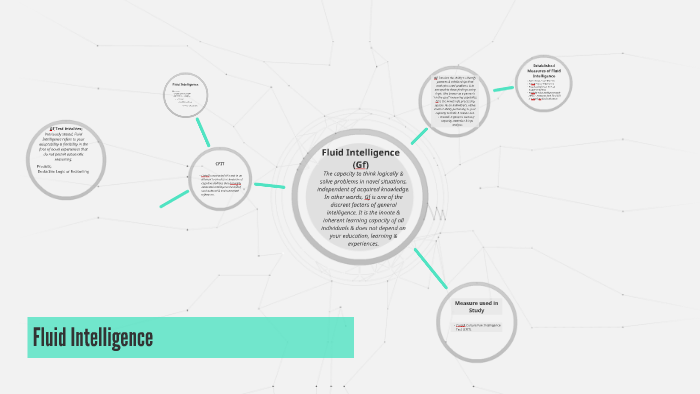


This ability to think critically, solve problems, and make logical decisions is crucial in many professions such as science, finance, law, and more. To summarize, fluid intelligence is a significant factor in determining one’s career success. However, a study by Alexander Grobe, suggested that occupational success is associated with crystallized intelligence and fluid intelligence has no role to play.


A study by Aaron Cochrane found that fluid intelligence is highly correlated with reasoning, attention, and memory. However, research has had mixed perspectives on fluid intelligence and career. Even Cattell did not deny the interaction between his two given forms of intelligence, namely- crystallized and fluid intelligence. The essence of fluid intelligence lies in the fact that it is the ability that helps individuals to attempt problems they have never encountered. What does the research say about Fluid Intelligence and career? During emergency situations, such as navigating into unknown spatial zones might call for this form of intelligence for rescue. However, Pilots must be able to analyze flight information, make decisions and solve problems very quickly and efficiently. This ability can lead to success in a variety of careers and provide individuals with a competitive edge in the job market.Ī broad base of knowledge in aviation, including flight patterns, weather patterns, and aircraft systems is given to pilots in the form of their crystallized intelligence. Thus, according to Cattell’s model of fluid intelligence, an individual’s fluid intelligence can play a significant role in determining their success in certain careers, particularly those that require the ability to think on the spot and solve problems very quickly. For example, in careers such as scientific research, financial analysis, and law, individuals with high levels of fluid intelligence are able to analyze complex information, make decisions based on logical reasoning, and find creative solutions to problems. In terms of career development, individuals with high levels of fluid intelligence tend to excel in careers that require critical thinking, and quick decision-making. It involves the ability to process information, identify patterns and make deductions based on that newly absorbed information which is one of the crucial characteristics of a logical thinker. It is about solving novel problems and making decisions in new and complex situations that one has never encountered before. Decoding how fluid intelligence can help in an individual’s careerĬattell’s model of fluid intelligence, also known as fluid and crystallized intelligence, proposes that intelligence can be divided into two distinct types: fluid and crystallized.įluid intelligence refers to the ability to think logically about a problem that relies very limitedly on prior learning.
FLUID INTELLIGENCE REFERS MOST DIRECTLY TO A PERSONS PROFESSIONAL
So, whether one is just starting out on their career path or is a seasoned professional looking to stay ahead of the curve, it’s worth taking a closer look at this important aspect of cognitive ability and what are the different career lines it dominates. Those with strong fluid intelligence are better equipped to navigate an ever-changing landscape, learn new skills, and stay relevant in an increasingly competitive job market. This type of intelligence is critical in today’s rapidly changing job market, where careers are no longer defined by a single skill set and lifelong job security is a thing of the past. It is the ability to think on one’s feet, to adapt to new situations, to problem solve, and to reason logically. Fluid intelligence is a fascinating concept that has captured the imagination of scientists, psychologists, and career experts alike.


 0 kommentar(er)
0 kommentar(er)
